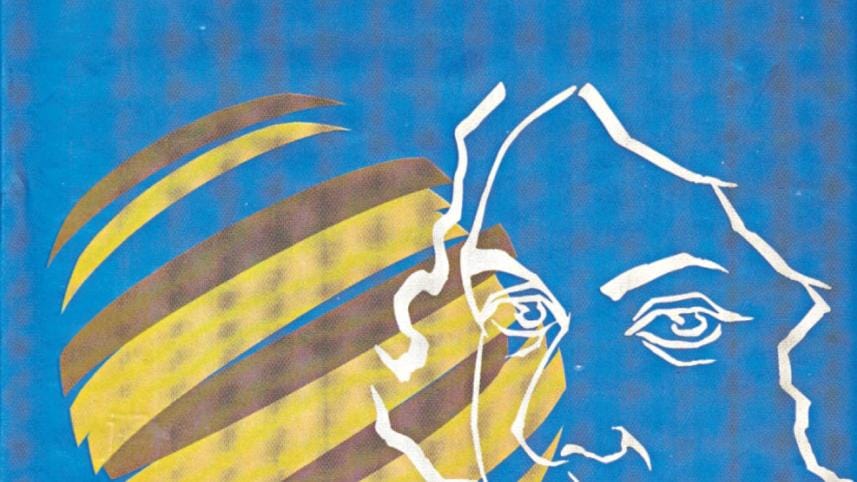An Illuminating Book on Nazrul

The national poet of Bangladesh Kazi Nazrul Islam was a versatile genius who had left his indelible marks in all branches of Bangla literature and culture. But due to a scarcity of translations of his works in foreign languages, not much research on his life and works could be undertaken at the international level. In this backdrop, the book 'Bideshir Nazrul-Charcha' written by noted researcher Khan Ferdousour Rahman in Bengali and published by the public sector entity Nazrul Institute is a trendsetter on the theme of studies conducted by foreigners on the Rebel Poet Kazi Nazrul Islam and his works. The continents covered by the book in separate chapters include Asia, Europe, North America and Australia. Besides, the first chapter of the book dwells on the greatness of Nazrul, a later chapter on different programs undertaken in the international arena with a Nazrul focus, and the penultimate chapter on the significance of Nazrul study in the global arena.
The book starts with a brief introduction and ends with a short and succinct conclusion on Nazrul's international exposures, followed by detailed references in both Bengali and English as well as an index in Bangla. It digs out and highlights many interesting facts about the coverage given to Nazrul and his works in different corners of the globe, some of which are mentioned below. The countries where Nazrul received this attention were: India, Pakistan, Iran, Japan, China and Singapore in Asia; Russia, Sweden, Belgium, Netherlands, Germany, Italy, France, England and Scotland in Europe; different US universities in North America as well as a few institutions in Australia.
According to Nazrul researcher Dr. Rafiqul Islam, many of Nazrul's poems were translated into regional languages of India alongside Hindi; these included Tamil, Orissa, Malayalam and Assamese. Side by side, his works were also translated into English, Japanese, Turkish, Swedish, French, Spanish, Russian, Farsi, Urdu and Chinese languages. Another Nazrul researcher Dr. Swarochish Sarkar classified the books in English on Nazrul into three categories: translations, biographical pieces and discussions. Of these, the first two categories have had maximum outputs; prominent among the contributors to these two categories were the Russian Mikhail Kurgantsev, Japanese Kyoko Niwa, Indian S. Krishnamurthy and the American Winston E. Langley.
The writer of the book points out that since 2002, a number of academics in North America have undertaken studies on Nazrul. A Nazrul Endowment Program was launched in the California State University and the Connecticut University of USA. Besides, Nazrul's works were included in the curriculum of some US universities. Teachers belonging to other institutes like the Columbia University, University of Massachusetts, Charleston College, Nassau Community College etc. are extending cooperation to these initiatives.
The evaluation of Nazrul by Winston Langley is quite noteworthy, who in his book 'Kazi Nazrul Islam: The Voice of Poetry and the Struggle of Human Wholeness' says: "He is perhaps the most remarkable poet of all time and most prolific composer the world has come to know". In down under, the Asian Studies department of the Victoria University of Australia has introduced a course on 'Kazi Nazrul Islam: Bangladesh's Forgotten Rebel Poet' from 2006. In Japan, Dr. Kazuo Azuma has translated some of Nazrul's poems into Japanese language, while Kyoko Niwa of Tokyo University has carried out research on his works. S. Botavinic of Leningrad first introduced Nazrul's poetry to the Soviet audience by translating his poems. Later, Poet Mikhail Kurgantsev played the most important role in popularising Nazrul in Russia through the publication of a translated compilation in 1962. Among those who researched on Nazrul in England, William Radici has been the most outstanding. His essays in English on Nazrul have been published in anthologies on Nazrul brought out by Bangla Academy.
The author laments that although Nazrul is still popular in the Bengali-speaking regions of the world, not many translations of his works in foreign languages are available. In contrast to Tagore, the local translators have mostly played the leading role in translating the poet into English. The pioneers among them during the 20th century included: Gopal Haldar, Kazi Motahar Hossain, Buddhadeb Basu, Abu Rushd, Syed Sajjad Hossain, Arun Kumar Mukherjee, Kabir Chowdhury, Rafiqul Islam, Sirajul Islam Chowdhury, Ashraf Siddiqui, Mohammad Moniruzzaman, Basudha Chakrabarty and Karunamoy Goswami. Selected poems of Nazrul were also translated into French, Hispanic and Italian languages by the late Professor Jahangir Tareq of the Institute of Modern Languages, Dhaka University. An outstanding compilation of the translated works in English of Kazi Nazrul titled 'Poetry of Kazi Nazrul Islam in English Translation' (Editor Muhammad Nurul Huda) was brought out during 1999-2000 on the occasion of Nazrul's birth centenary.
A book in Urdu titled 'Nazrul Islam' was published by the Dhaka University Professor Dr. Mohammad Abdullah in the past. Another book on Nazrul in Turkish language was published by the Government of Bangladesh in 2006. A comprehensive collection on the poems, novels and stories of Nazrul translated into Urdu by the late poet Ahmed Sadi was published by the Nazrul Institue in 2003. A recent notable edition to the English translations of Nazrul's works was 'Unfettered' (2013 translation of the novel 'Bandhanhara'), which was translated by a literary outfit called 'The Reading Circle' and edited by Professor Niaz Zaman. According to statistics supplied by Nazrul Institute, the literary works of Nazrul have been translated into 11 languages. The author of this concise volume on a very timely and interesting theme concludes by expressing the hope that it may not be very long before the global citizenry craves for embracing the ideals and philosophy of Rebel Poet Kazi Nazrul Islam and the world gets illuminated by his light through the artistic process of studying his works at the global level.
The reviewer is a former editor of Bangladesh Quarterly, currently a freelance writer cum translator. Email: hahmed1960@gmail.com



 For all latest news, follow The Daily Star's Google News channel.
For all latest news, follow The Daily Star's Google News channel.
Comments